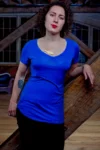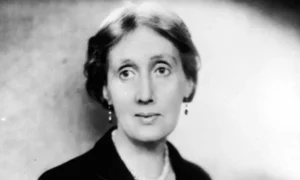The Courage to Be Yourself: Virginia Woolf on How to Hear Your Soul
INSPIRATIONAL, 2 Oct 2023
Maria Popova | The Marginalian – TRANSCEND Media Service
 It is an ongoing mystery: What makes you and your childhood self the same person. Across a lifetime of physiological and psychological change, some center holds. Eudora Welty called it “the continuous thread of revelation.” Walt Whitman saw it as something “independent, lifted out from all else, calm, like the stars, shining eternal.” Complexity theory traces it to the quantum foam.
It is an ongoing mystery: What makes you and your childhood self the same person. Across a lifetime of physiological and psychological change, some center holds. Eudora Welty called it “the continuous thread of revelation.” Walt Whitman saw it as something “independent, lifted out from all else, calm, like the stars, shining eternal.” Complexity theory traces it to the quantum foam.
The best shorthand we have for it is soul.
“One can’t write directly about the soul. Looked at, it vanishes,” Virginia Woolf (January 25, 1882–March 28, 1941) lamented in her diary. But writing directly about the soul, and with tremendous insight, is precisely what she does in a wonderful essay about the essays of Montaigne — his epochal “attempt to communicate a soul,” a “miraculous adjustment of all these wayward parts that constitute the human soul” — included in her classic Common Reader (public library).
Contemplating the soul — that most private part of us — as “so complex, so indefinite, corresponding so little to the version which does duty for her in public,” she writes:
Beyond the difficulty of communicating oneself, there is the supreme difficulty of being oneself. This soul, or life within us, by no means agrees with the life outside us. If one has the courage to ask her what she thinks, she is always saying the very opposite to what other people say.
That courage is what Whitman celebrated when he decreed to “dismiss whatever insults your own soul, and your very flesh shall be a great poem.” Only by listening to the voice of the soul — a voice by definition nonconformist, rising above the din of convention and expectation and should — do we become fully and happily ourselves. To be aware of ourselves is to hear that voice. To be content in ourselves is to listen to it. Woolf writes:
The man* who is aware of himself is henceforward independent; and he is never bored, and life is only too short, and he is steeped through and through with a profound yet temperate happiness. He alone lives, while other people, slaves of ceremony, let life slip past them in a kind of dream. Once conform, once do what other people do because they do it, and a lethargy steals over all the finer nerves and faculties of the soul. She becomes all outer show and inward emptiness; dull, callous, and indifferent.
Observing that the souls we most wish to resemble “are always the supplest” — for “a self that goes on changing is a self that goes on living” — Woolf arrives at what it takes to be fully oneself:
Let us simmer over our incalculable cauldron, our enthralling confusion, our hotch-potch of impulses, our perpetual miracle — for the soul throws up wonders every second. Movement and change are the essence of our being; rigidity is death; conformity is death: let us say what comes into our heads, repeat ourselves, contradict ourselves, fling out the wildest nonsense, and follow the most fantastic fancies without caring what the world does or thinks or says.
Complement with E.E. Cummings on the courage to be yourself, Tracy K. Smith’s short, splendid poem “The Everlasting Self,” and the poetic science of how we went from cells to souls, then revisit Woolf on self-knowledge, the remedy for self-doubt, the relationship between loneliness and creativity, what makes love last, the consolations of growing older, and her epiphany about the meaning of creativity.
_______________________________________
 My name is Maria Popova — a reader, a wonderer, and a lover of reality who makes sense of the world and herself through the essential inner dialogue that is the act of writing. The Marginalian (which bore the unbearable name Brain Pickings for its first 15 years) is my one-woman labor of love, exploring what it means to live a decent, inspired, substantive life of purpose and gladness. Founded in 2006 as a weekly email to seven friends, eventually brought online and now included in the Library of Congress permanent web archive, it is a record of my own becoming as a person — intellectually, creatively, spiritually, poetically — drawn from my extended marginalia on the search for meaning across literature, science, art, philosophy, and the various other tendrils of human thought and feeling. A private inquiry irradiated by the ultimate question, the great quickening of wonderment that binds us all: What is all this? (More…)
My name is Maria Popova — a reader, a wonderer, and a lover of reality who makes sense of the world and herself through the essential inner dialogue that is the act of writing. The Marginalian (which bore the unbearable name Brain Pickings for its first 15 years) is my one-woman labor of love, exploring what it means to live a decent, inspired, substantive life of purpose and gladness. Founded in 2006 as a weekly email to seven friends, eventually brought online and now included in the Library of Congress permanent web archive, it is a record of my own becoming as a person — intellectually, creatively, spiritually, poetically — drawn from my extended marginalia on the search for meaning across literature, science, art, philosophy, and the various other tendrils of human thought and feeling. A private inquiry irradiated by the ultimate question, the great quickening of wonderment that binds us all: What is all this? (More…)
Go to Original – themarginalian.org
Tags: Life
DISCLAIMER: The statements, views and opinions expressed in pieces republished here are solely those of the authors and do not necessarily represent those of TMS. In accordance with title 17 U.S.C. section 107, this material is distributed without profit to those who have expressed a prior interest in receiving the included information for research and educational purposes. TMS has no affiliation whatsoever with the originator of this article nor is TMS endorsed or sponsored by the originator. “GO TO ORIGINAL” links are provided as a convenience to our readers and allow for verification of authenticity. However, as originating pages are often updated by their originating host sites, the versions posted may not match the versions our readers view when clicking the “GO TO ORIGINAL” links. This site contains copyrighted material the use of which has not always been specifically authorized by the copyright owner. We are making such material available in our efforts to advance understanding of environmental, political, human rights, economic, democracy, scientific, and social justice issues, etc. We believe this constitutes a ‘fair use’ of any such copyrighted material as provided for in section 107 of the US Copyright Law. In accordance with Title 17 U.S.C. Section 107, the material on this site is distributed without profit to those who have expressed a prior interest in receiving the included information for research and educational purposes. For more information go to: http://www.law.cornell.edu/uscode/17/107.shtml. If you wish to use copyrighted material from this site for purposes of your own that go beyond ‘fair use’, you must obtain permission from the copyright owner.
